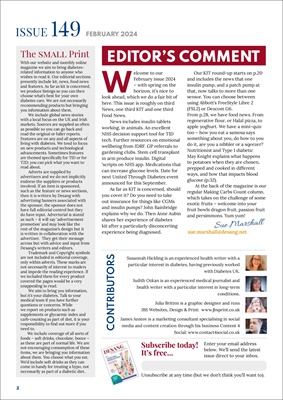
2
ISSUE 149 Our lead feature in this,
our first issue of 2024,
is about a mother
inspired by her child's
T1D diagnosis to create a charity,
Hypo Hounds, that trains dogs to
detect glucose levels. These canine
'guardians' can then alert their
'client' (owner) when they go too
high or too low. It's a niche need,
particularly with CGM availability
on the rise, but for those who can't
express themselves very well, or
compromised hypo awareness, it's
a lifeline (p.20). The charity's CEO
Jane Pearman, shares her story and
explains how the dogs are trained
then matched to clients.
On p. 12 is an overview of insulin
pumps and CGMs as more of them
start 'talking' to each other. A fair bit
of that news is only based in the US
at the moment, but it's a look at what
is likely to come to the UK at some
point. We'll certainly let you know
when they do!
Photographer James Clarke
shares his diagnosis story and also
EDITOR'S COMMENT
what diabetes kit he used in the past
and uses now, and how it's affected
his career and other life choices.
He kindly let us use his personal
photographs to illustrate the article,
and how he feels about his diabetes.
In a news item on p.10 we report
on T1DE - the rise (and risk) of Type
1 disordered eating and how the NHS
is attempting to address it. On p.18
NHS dietitian Lisa Poole explains
the ins and outs of the NHS 'soups
and shakes' diet, including how to
access it. Then, on p.38, registered
nutritionist and Type-oner May
Knight explains why we need fibre in
our diets. Turns out there's a lot of
reasons.
The rest of the magazine is very
'green', in as much as we return
to exploring the wonders of both
cabbage and watercress, with recipes
(both are high in fibre so feel free to
indulge)!
sue.marshall@desang.net
Sue Marshall
Enter your email address
below. We'll send the latest
issue direct to your inbox.
Unsubscribe at any time (but we don't think you'll want to).
FEBRUARY 2024
The small Print
With our website and monthly online
magazine we aim to bring diabetesrelated
information to anyone who
wishes to read it. Our editorial sections
presently include kit, news, food news
and features. As far as kit is concerned,
we produce listings so you can then
choose what's best for your own
diabetes care. We are not necessarily
recommending products but bringing
you information about them.
We include global news stories
with a local focus on the UK and Irish
markets. Sources are supplied as often
as possible so you can go back and
read the original or fuller reports.
Features are on any and all aspects of
living with diabetes. We tend to focus
on new products and technological
advancements. Sometimes features
are themed specifically for T1D or for
T2D; you can pick what you want to
read about.
Adverts are supplied by
advertisers and we do not implicitly
endorse the suppliers or products
involved. If an item is sponsored,
such as the feature or news sections,
then it is written by Desang with
advertising banners associated with
the sponsor; the sponsor does not
have full editorial control but they
do have input. Advertorial is stated
as such - it will say 'advertisement
promotion' and may look like the
rest of the magazine's design but it
is written in collaboration with the
advertiser. They get their message
across but with advice and input from
Desang's writers and editors.
Trademark and Copyright symbols
are not included in editorial coverage,
only within adverts. These marks are
not necessarily of interest to readers
and impede the reading experience. If
we included them for every product
covered the pages would be a very
unappealing to read.
We aim to bring you information,
but it's your diabetes. Talk to your
medical team if you have further
questions or concerns. While
we report on products such as
supplements or glycaemic index and
carb-counting as part of diet, it is your
responsibility to find out more if you
need to.
We include coverage of all sorts of
foods - soft drinks, chocolate, booze -
as these are part of normal life. We are
not encouraging consumption of these
items, we are bringing you information
about them. You choose what you eat.
We'd include soft drinks as they can
come in handy for treating a hypo, not
necessarily as part of a diabetic diet.
Susannah Hickling is an experienced health writer with a
particular interest in diabetes, having previously worked
with Diabetes UK.
Judith Ozkan is an experienced medical journalist and
health writer with a particular interest in long-term
conditions.
Julia Britten is a graphic designer and runs
JBS Websites, Design & Print: www.jbsprint.co.uk
James Anstee is a marketing consultant specialising in social
media and content creation through his business Content 4
Social: www.contact4social.co.uk